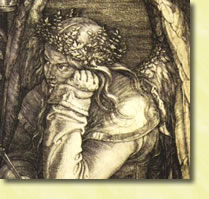Over at StandFirm, Sarah Hey has interrupted the usual grousing to post “A Few Thoughts on Happiness: Is Happiness A “Moral Obligation”?”. This led to the following offhand remarks.
 While Aristotle (and Christian eudaemonists like Augustine and Thomas Aquinas and Richard Hooker) granted that beatitude (translated “happiness,” but more like “complete well being”) was correlated with character, they saw it as a byproduct of something else, namely doing a worthwhile activity. To set out to pursue happiness in itself led to unhappiness. However, doing something inherently worthwhile, and doing it well, can lead to happiness.
While Aristotle (and Christian eudaemonists like Augustine and Thomas Aquinas and Richard Hooker) granted that beatitude (translated “happiness,” but more like “complete well being”) was correlated with character, they saw it as a byproduct of something else, namely doing a worthwhile activity. To set out to pursue happiness in itself led to unhappiness. However, doing something inherently worthwhile, and doing it well, can lead to happiness.
This is the unexpressed assumption in Ignatius Loyola’s Spiritual Exercises, the intent of which is to help sort out one’s vocation. One begins not by asking “What makes me happy?,” but “What do I love?”
How to be happy? Pursue those things you love doing, and, to the extent it is possible, do good. Don’t pursue happiness for its own sake. Be aware that if you’re unhappy, that may be a sign that you need to change something you’re doing.
May be, not must be. Our ancestors were very savvy about the passions (not to be equated with the emotions, full stop), and recognized that some people just had a disposition to melancholy.
The most significant way in which Augustine, Thomas Aquinas, and Richard Hooker differ from Aristotle on happiness is that Aristotle believed neither in a personal God nor in an afterlife. Like so many of our contemporaries, Aristotle believed that if we were going to be happy, it had to be here and now. In contrast, the Augustinian tradition recognizes that God is the Greatest Good (summum bonum), and true happiness can be found only in the beatific vision (seeing God “face to face” and enjoying him forever). This is what we are made for, and it is the fuel that drives all our seeking for happiness. As Augustine expressed it at the beginning of the Confessions: “You have made us for yourself, and our hearts our restless until they rest in you.”
This is a tremendous help insofar as it relieves the [implicitly Pelagian] demand of our culture that we MUST be happy, and we must be happy now. Augustine, Thomas and Hooker correct not only Aristotle, but the contemporary culture’s notion of happiness in the following ways:
1) They make clear that only God can truly make us happy. This does not mean that there is no genuine happiness connected with created things or “secular” activities, but it does relativize the kind of happiness we expect from them. We shouldn’t be surprised if our spouses, our jobs, our bodies, or our “stuff” does not make us happy. They’re not supposed to.
2) They introduce a personal dimension to happiness. Happiness comes not from things, but from friendship with God, and, to a lesser extent, from friendship with others. Thomas Aquinas is especially good here.
3) They remind us that life is a pilgrimage, and we are pilgrims (viators) on a journey. We’re moving to happiness, and we can be certain that some day we will have it, but we’re not there yet, and we don’t have to insist on having happiness NOW. Meanwhile, we can get on with the task at hand.
4) Their understanding of happiness helps us to be grateful for the genuine goods that we enjoy, realizing that they are gifts from our Creator.
5) They remind us that some of the things that our culture tells us will make us happy will not. Happiness is not equivalent to pleasure. Pursuing activities that are contrary to our true end—knowing and loving God—will actually make us unhappy. For Augustine, the first step in ethics is sorting out true from false goods, and learning to pursue those goods that will actually make us happy, while avoiding those siren voices (apparent, but false goods) that promise us happiness, but will ultimately make us miserable because they are self-destructive.
6) A rule of life is important. Mundane activities like regular private prayer, reading/praying the daily office, Sunday worship, lectio divina (reading Scripture and “spiritual” texts), being with friends, physical exercise, being in nature, playing music, doing “chores,” preparing a good meal and sharing it with friends and family, are the kinds of “habits” that make the conditions possible for the kinds of limited happiness we can expect in this life, and help form us to be the kind of people who will be happy with the only kind of happiness that God has to offer in the next life–himself. Contrary to certain distorted forms of Lutheranism, this is not “imposing law” on people. It recognizes that there is a correlation between our practices and the kinds of people we become. I do not have to buy flowers for my wife to prove that I love her, and I certainly do not buy flowers for my wife in order to “earn” her love; however, occasionally buying flowers for my wife is one of those practices that helps creates friendship; it not only expresses love, it helps create love. Similarly, we don’t pray, read the Bible, receive the Eucharist to “earn” God’s favor. Nonetheless, these are practices that not only express our friendship with God, but help to make it grow over time. We don’t do these things because God needs them, but because we do.


